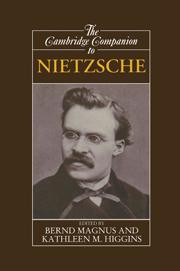Book contents
- Frontmatter
- Introduction to the Cambridge companion to Nietzsche
- Part I Introduction to Nietzsche's works
- Part II The use and abuse of Nietzsche's life and works
- Part III Nietzsche as philosopher
- Part IV Nietzsche's influence
- 9 Nietzsche in the twentieth century
- 10 Nietzsche's French legacy
- 11 Nietzsche and East Asian thought
- Selected bibliography
- Index
10 - Nietzsche's French legacy
from Part IV - Nietzsche's influence
Published online by Cambridge University Press: 28 May 2006
- Frontmatter
- Introduction to the Cambridge companion to Nietzsche
- Part I Introduction to Nietzsche's works
- Part II The use and abuse of Nietzsche's life and works
- Part III Nietzsche as philosopher
- Part IV Nietzsche's influence
- 9 Nietzsche in the twentieth century
- 10 Nietzsche's French legacy
- 11 Nietzsche and East Asian thought
- Selected bibliography
- Index
Summary
In Memoriam: Sarah Kofman 1934-1994
What charity and delicate precision those Frenchmen possess! Even the most acute-eared of the Greeks must have approved of this art, and one thing they would even have admired and adored, the French wittiness of expression. . .” (The Wanderer and His Shadow, 214)
The moment Germany rises as a great power, France gains a new importance as a cultural power. A great deal of current spiritual seriousness and passion has already emigrated to Paris; the question of pessimism, for instance, the Wagner question, virtually every psychological and artistic question, is speculated on with incomparably more subtlety and thoroughness there than in Germany . . .” (Twilight of the Idols, “What the Germans Lack,”)
As an artist one has no home in Europe, except Paris . . .” (Ecce Homo, “Why I Am So Clever”)
That we find, approximately a century after his productivity ended, commentators referring to French “Nietzscheanism” is a development that we can imagine would have pleased Friedrich Nietzsche. On several occasions, Nietzsche remarked that he felt more at home with the French, their culture and their language, than with Germans. More than once, he regretted having to write in German rather than in a more fluid, playful, musical language like French. And more than once, he felt his spiritual kin to reside west of the Rhine, preferring the philosophical companionship of Montaigne, Voltaire, and La Rochefoucauld to that of Leibniz, Kant, or Hegel.
- Type
- Chapter
- Information
- The Cambridge Companion to Nietzsche , pp. 323 - 355Publisher: Cambridge University PressPrint publication year: 1996
- 19
- Cited by

